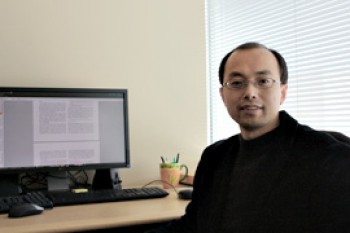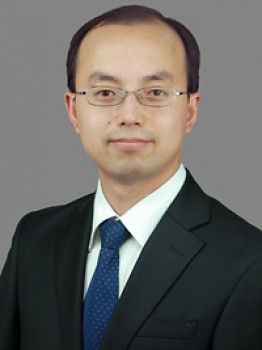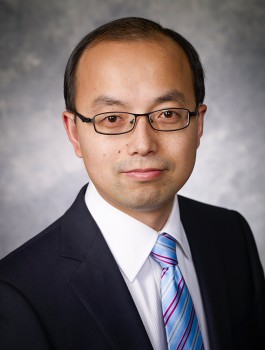PhD - Computer Science
Purdue University - 2011
Professional Preparation
Research Areas
Research Interests
- Software Security (binary code analysis and its applications to vulnerability discovery, malicious code analysis, software hardening, and binary code reuses in new applications) [ICDCS13, ACSAC'12, CCS'12, DFRWS'12,NDSS'10, DSN'10, NDSS'09, NDSS'08, FSE'08, , SOCC'12, S&P'12,NDSS'11]
- Cloud Computing (and Virtualization) (enhancing cloud security and the virtual machine management in the cloud) [ISCA'13, VEE'13, SOCC'12, S&P'12, NDSS'11]
- Memory Data Analysis (for Introspection, Digital Forensics) (data structure guided memory as well as disk data analysis) [ISCA'13, DSN'13, SOCC'12, DFRWS'12, NDSS'12, NDSS'11, NDSS'10]
Publications
Scott Hand, Zhiqiang Lin, Guofei Gu, and Bhavani Thuraisingham. "Bin-Carver: Automatic Recovery of Binary Executable Files". To appear in Proceedings of the 12th Annual Digital Forensics Research Conference, Washington DC, August 2012 2012 - Publication
Yangchun Fu, and Zhiqiang Lin. "Space Traveling across VM: Automatically Bridging the Semantic Gap in Virtual Machine Introspection via Online Kernel Data Redirection". InProceedings of the 33rd IEEE Symposium on Security and Privacy, San Fransisco, CA, May 2012 2012 - Publication
Zhiqiang Lin, Junghwan Rhee, Chao Wu, Xiangyu Zhang, and Dongyan Xu. "DIMSUM: Discovering Semantic Data of Interest from Un-mappable Memory with Confidence". InProceedings of the 19th ISOC Network and Distributed System Security Symposium, San Diego, CA, February 2012 2012 - Publication
Junghwan Rhee, Zhiqiang Lin, and Dongyan Xu. "Characterizing Kernel Malware Behavior with Kernel Data Access Patterns". In Proceedings of the 6th ACM Symposium on Information, Computer and Communications Security, Hong Kong, March 2011 2011 - Publication
Zhiqiang Lin, Junghwan Rhee, Xiangyu Zhang, Dongyan Xu, and Xuxian Jiang. "SigGraph: Brute Force Scanning of Kernel Data Structure Instances Using Graph-based Signatures". In Proceedings of the 18th Network and Distributed System Security Symposium, San Diego, CA, February 2011 2011 - Publication
Tao Bao, Yunhui Zheng, Zhiqiang Lin, Xiangyu Zhang and Dongyan Xu. "Strict Control Dependence and its Effect on Dynamic Information Flow Analyses". In Proceedings of the 2010 International Symposium on Software Testing and Analysis,Trento, Italy. July 2010 2010 - Publication
Additional Information
Service
- Panelist: NSF proposal review panels, 2012
- Publication Chair: IEEE International Performance Computing and Communications Conference (IPCCC), 2012
-
TPC Member:
- IEEE International Conference on Distributed Computing Systems (ICDCS), 2014
- ACM Symposium on Information, Computer and Communications Security (AsiaCCS), 2013
- IEEE/ACM International Symposium on Cluster, Cloud and Grid Computing (CCGrid), 2013
- IEEE International Conference on Big Data (BigData), 2013
- International Conference on Privacy, Security and Trust (PST), 2013
- International Workshop on Security in Embedded Systems and Smartphones (SESP), 2013
- Annual Digital Forensics Research Conference (DFRWS), 2013
- International Conference on Availability, Reliability and Security (ARES), 2012
- IEEE International Performance Computing and Communications Conference (IPCCC), 2011, 2012
- IEEE Services Workshop on Security and Privacy Engineering (SPE), 2012, 2013
- Workshop on Hardware and Architectural Support for Security and Privacy (HASP), 2012, 2013
- IEEE Information Assurance Workshop (IAW), 2007
Teaching
Spring 2013 CS 4393: Computer and Network Security Fall 2012 CS 6324: Information Security Spring 2012 CS 6V81-005: Systems security and binary code analysis Fall 2011 CS 6V81-005: Advanced digital forensics and data reverse engineeringNews Articles
Researcher Seeks Ways to Keep Old Data Secure
 Much as old cars running on leaded gas caused health hazards in decades past, outdated computer systems still in use today create hazards that threaten the security of sensitive data.In an attempt to ease the dependence of government agencies and corporations on the use of outdated and insecure operating systems, researchers from UT Dallas and Purdue University recently received a $1.4 million grant to help extract and transition this data onto newer, more secure systems. Dr. Zhiqiang Lin, assistant professor in the Erik Jonsson School of Engineering and Computer Science, is working jointly with Purdue University on the project funded by the Defense Advanced Research Projects Agency. The data resides on older systems, or so-called legacy systems, and each has their own set of specific capabilities. The research team, therefore, will investigate how to move data to new systems while preserving what they can of legacy-system capabilities.
Much as old cars running on leaded gas caused health hazards in decades past, outdated computer systems still in use today create hazards that threaten the security of sensitive data.In an attempt to ease the dependence of government agencies and corporations on the use of outdated and insecure operating systems, researchers from UT Dallas and Purdue University recently received a $1.4 million grant to help extract and transition this data onto newer, more secure systems. Dr. Zhiqiang Lin, assistant professor in the Erik Jonsson School of Engineering and Computer Science, is working jointly with Purdue University on the project funded by the Defense Advanced Research Projects Agency. The data resides on older systems, or so-called legacy systems, and each has their own set of specific capabilities. The research team, therefore, will investigate how to move data to new systems while preserving what they can of legacy-system capabilities.
Project Gives Computers a More Powerful Way to Detect Threats
 UT Dallas computer scientists have developed a technique to automatically allow one computer in a virtual network to monitor another for intrusions, viruses or anything else that could cause a computer to malfunction.The technique has been dubbed “space travel” because it sends computer data to a world outside its home, and bridges the gap between computer hardware and software systems. “Space travel might change the daily practice for many services offered virtually for cloud providers and data centers today, and as this technology becomes more popular in a few years, for the user at home on their desktops,” said Dr. Zhiqiang Lin, the research team’s leader and an assistant professor of computer science in the Erik Jonsson School of Engineering and Computer Science. As cloud computing is becoming more popular, new techniques to protect the systems must be developed. Since this type of computing is Internet-based, skilled computer specialists can control the main part of the system virtually – using software to emulate hardware.
UT Dallas computer scientists have developed a technique to automatically allow one computer in a virtual network to monitor another for intrusions, viruses or anything else that could cause a computer to malfunction.The technique has been dubbed “space travel” because it sends computer data to a world outside its home, and bridges the gap between computer hardware and software systems. “Space travel might change the daily practice for many services offered virtually for cloud providers and data centers today, and as this technology becomes more popular in a few years, for the user at home on their desktops,” said Dr. Zhiqiang Lin, the research team’s leader and an assistant professor of computer science in the Erik Jonsson School of Engineering and Computer Science. As cloud computing is becoming more popular, new techniques to protect the systems must be developed. Since this type of computing is Internet-based, skilled computer specialists can control the main part of the system virtually – using software to emulate hardware.
Computer Scientist Seeks Stronger Security Shroud for the Cloud
 Dr. Zhiqiang Lin, of the Erik Jonsson School of Engineering and Computer Science at UT Dallas, is working to advance the field of cloud computing, and in the process, has developed a technique that allows one computer in a virtual network to monitor another for invasions or viruses.
Dr. Zhiqiang Lin, of the Erik Jonsson School of Engineering and Computer Science at UT Dallas, is working to advance the field of cloud computing, and in the process, has developed a technique that allows one computer in a virtual network to monitor another for invasions or viruses.Lin’s research has earned the assistant professor of computer science a National Science Foundation Faculty Early Career Development (CAREER) Award, which provides him with $500,000 in funding for five years.
Professor to Develop Framework to Protect Computers' Cores
UT Dallas cybersecurity expert Dr. Zhiqiang Lin has received funding from the U.S. Air Force to develop a defense framework that burrows deep into a computer system to protect its core.The Young Investigator Research Program (YIP) award from the Air Force Office of Scientific Research (AFOSR) provides up to $360,000 over three years to support Lin in developing this framework. Lin is an assistant professor of computer science in the Erik Jonsson School of Engineering and Computer Science, and member of the Cyber Security Research and Education Institute (CSI) at UT Dallas.
